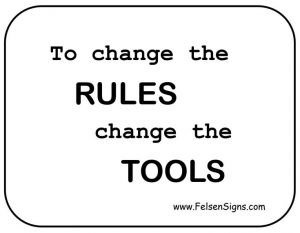The participants in the meetings of the Homebrew Computer Club were out to change the rules for the use of computers. The priesthood of “computer professionals” looked aghast on lesser-qualified people getting their hands into their magical creations and making significant changes to allow other, even less-qualified people to use them for trivial “un-serious” functions like games, simple office functions for use on kitchen tables, and elementary programming exercises.
They exhorted us to cease our practice of sharing software even where the programmers wanted to share – it was threatening to their concepts of their own value. We didn’t care, and went ahead to create cheap, simple computers that would litter up the landscape, drawing attention away from their impressive, looming “mainframes” where they could pose in white lab coats.
In a broader sense, we were out to change the rules of individuals’ participation in society – science fiction had for years told us how, when computer power became available to the individual, it would give us an advantage over bureaucratized, sclerotic larger businesses. At Homebrew everybody knew this.
In 1975 I inserted this slogan in an article that laid out how and why to design the forthcoming personal computers: “To Change the Rules, Change the Tools.” It’s still true.
